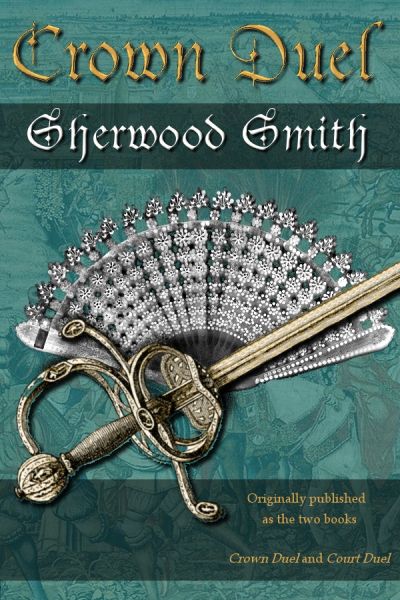Blue Blooded Ingenue
Crown Duel (Crown Duel, volume 1)
By Sherwood Smith

27 Apr, 2016
0 comments
1997’s young adult fantasy Crown Duel is the first novel in Sherwood Smith’s Crown Duel series. It was followed by 1998’s Court Duel. Both are included in this omnibus. Together, they are part of the larger Sartorias-deles sequence.
Two young aristocrats, Meliara and her brother Bran, learn that King Galdran is planning to break the Covenant with the Hill Folk; he wants to clear-cut the valuable colour trees of Tlanth, Meliara and Bran’s domain. The two feel that they must protect the trees, and the Covenant, and the only way to do so seems to be mounting a rebellion against their liege lord. Conveniently, the siblings have been plotting an uprising for some time; Galdran is an all-round bad king and he is comprehensively hated.
Their rebellion is not going well. Potential allies have refused to help; their mercenary army has already betrayed them.
Royal forces are pouring into Tlanth. Unable to overcome their enemies in direct battle, the Tlanthians settle for guerrilla warfare. In that struggle, they have an advantage; they know their hills and forests intimately. They have a chance:
if they can survive the losses of a war of attrition;
if their enemy does not simply burn the forest down around them;
if Meliara can avoid capture … again. She is remarkably capture-prone.
If the king is defeated, who will replace him? The siblings have not thought that far ahead…
~oOo~
This novel reminded me of Andre Norton’s Witch World books. I felt that Tlanth was only an inter-dimensional gate away from Escarp. This did not surprise me, as I knew that Smith and Norton had previously collaborated. However, I was surprised to learn that they had only collaborated on Time Trader novels. I would have thought that the Witch World would have been a better setting for their combined talents.
Meliara is young and naive; she has been raised in the country, not at court. So there is some excuse for her tendency to fall into enemy hands. But the underlying reason is that she is a remarkably poor judge of character (a talent that can be honed anywhere). She consistently puts her trust in treacherous allies, while ignoring the obvious allies, the ones in plain sight. Bad for Meliara, bad for her rebellion, but good for the plot. It is yet another instance of the failure modes of feudal systems; in a democracy, her people could vote her out of office after the first major scandal.
Not that she stays captured. Sherwood is no George R.R. Martin; she does not kill off main characters unexpectedly. Meliara always escapes, and the rebellion succeeds, thanks to a Hill Folk deus ex machina. This will probably not be a surprise to the alert reader; the ending is foreshadowed by the historical notes at the beginning of the novel. The Covenant does not exist because the humans of this world are amiable tree-huggers. It exists because very bad things happen when people anger the Hill Folk. Think of the Covenant as the equivalent of a “do not lick reactor fuel rods” safety sign.
The author has added some short pieces at the end of the ebook, providing additional perspective on the events of the novel. Adult readers may find the book a bit too straightforward, although I would point out that lots of adult fantasies never bother to think about what follows victory. The teenagers for whom this book is clearly intended may well find it rewarding.
Crown Duel can be purchased here.
